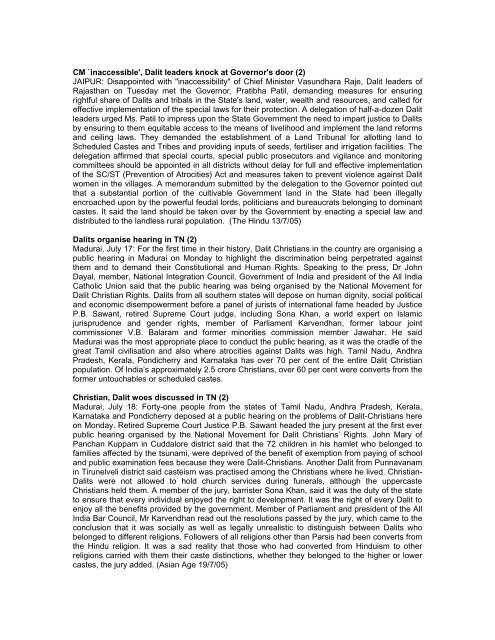DALIT ATROCITIES - 2005 - Indian Social Institute
DALIT ATROCITIES - 2005 - Indian Social Institute
DALIT ATROCITIES - 2005 - Indian Social Institute
Create successful ePaper yourself
Turn your PDF publications into a flip-book with our unique Google optimized e-Paper software.
CM `inaccessible', Dalit leaders knock at Governor's door (2)<br />
JAIPUR: Disappointed with "inaccessibility" of Chief Minister Vasundhara Raje, Dalit leaders of<br />
Rajasthan on Tuesday met the Governor, Pratibha Patil, demanding measures for ensuring<br />
rightful share of Dalits and tribals in the State's land, water, wealth and resources, and called for<br />
effective implementation of the special laws for their protection. A delegation of half-a-dozen Dalit<br />
leaders urged Ms. Patil to impress upon the State Government the need to impart justice to Dalits<br />
by ensuring to them equitable access to the means of livelihood and implement the land reforms<br />
and ceiling laws. They demanded the establishment of a Land Tribunal for allotting land to<br />
Scheduled Castes and Tribes and providing inputs of seeds, fertiliser and irrigation facilities. The<br />
delegation affirmed that special courts, special public prosecutors and vigilance and monitoring<br />
committees should be appointed in all districts without delay for full and effective implementation<br />
of the SC/ST (Prevention of Atrocities) Act and measures taken to prevent violence against Dalit<br />
women in the villages. A memorandum submitted by the delegation to the Governor pointed out<br />
that a substantial portion of the cultivable Government land in the State had been illegally<br />
encroached upon by the powerful feudal lords, politicians and bureaucrats belonging to dominant<br />
castes. It said the land should be taken over by the Government by enacting a special law and<br />
distributed to the landless rural population. (The Hindu 13/7/05)<br />
Dalits organise hearing in TN (2)<br />
Madurai, July 17: For the first time in their history, Dalit Christians in the country are organising a<br />
public hearing in Madurai on Monday to highlight the discrimination being perpetrated against<br />
them and to demand their Constitutional and Human Rights. Speaking to the press, Dr John<br />
Dayal, member, National Integration Council, Government of India and president of the All India<br />
Catholic Union said that the public hearing was being organised by the National Movement for<br />
Dalit Christian Rights. Dalits from all southern states will depose on human dignity, social political<br />
and economic disempowerment before a panel of jurists of international fame headed by Justice<br />
P.B. Sawant, retired Supreme Court judge, including Sona Khan, a world expert on Islamic<br />
jurisprudence and gender rights, member of Parliament Karvendhan, former labour joint<br />
commissioner V.B. Balaram and former minorities commission member Jawahar. He said<br />
Madurai was the most appropriate place to conduct the public hearing, as it was the cradle of the<br />
great Tamil civilisation and also where atrocities against Dalits was high. Tamil Nadu, Andhra<br />
Pradesh, Kerala, Pondicherry and Karnataka has over 70 per cent of the entire Dalit Christian<br />
population. Of India’s approximately 2.5 crore Christians, over 60 per cent were converts from the<br />
former untouchables or scheduled castes.<br />
Christian, Dalit woes discussed in TN (2)<br />
Madurai, July 18: Forty-one people from the states of Tamil Nadu, Andhra Pradesh, Kerala,<br />
Karnataka and Pondicherry deposed at a public hearing on the problems of Dalit-Christians here<br />
on Monday. Retired Supreme Court Justice P.B. Sawant headed the jury present at the first ever<br />
public hearing organised by the National Movement for Dalit Christians’ Rights. John Mary of<br />
Panchan Kuppam in Cuddalore district said that the 72 children in his hamlet who belonged to<br />
families affected by the tsunami, were deprived of the benefit of exemption from paying of school<br />
and public examination fees because they were Dalit-Christians. Another Dalit from Punnavanam<br />
in Tirunelveli district said casteism was practised among the Christians where he lived. Christian-<br />
Dalits were not allowed to hold church services during funerals, although the uppercaste<br />
Christians held them. A member of the jury, barrister Sona Khan, said it was the duty of the state<br />
to ensure that every individual enjoyed the right to development. It was the right of every Dalit to<br />
enjoy all the benefits provided by the government. Member of Parliament and president of the All<br />
India Bar Council, Mr Karvendhan read out the resolutions passed by the jury, which came to the<br />
conclusion that it was socially as well as legally unrealistic to distinguish between Dalits who<br />
belonged to different religions. Followers of all religions other than Parsis had been converts from<br />
the Hindu religion. It was a sad reality that those who had converted from Hinduism to other<br />
religions carried with them their caste distinctions, whether they belonged to the higher or lower<br />
castes, the jury added. (Asian Age 19/7/05)

















